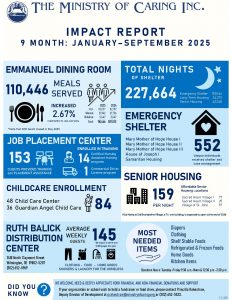Stay up to date with events, news, and opportunities by signing up for the Ministry of Caring's quarterly newsletter.
Ministry of Caring Inc.
Impact statement for January – September, 2025
The infographic below shows the impact of your contributions to the people we serve. Thank you for your kind support!

Equal Employment Opportunity Policy Statement
It is the policy of the Ministry of Caring Inc. not to discriminate against any applicant for employment, or any employee because of age, color, sex, disability, national origin, race, religion, or veteran status.
Ministry of Caring Inc. will take affirmative action to ensure that he EEO policy is implemented, with regard to advertising, application procedures, compensation, demotion, employment, fringe benefits, job assignment, job classification, layoff, leave promotion, recruitment, rehire, social activities, training, termination, transfer, upgrade and working conditions.
Ministry of Caring Inc. will continue to make it understood by the employment entities with which it deals, and in employment opportunity announcements that the foregoing is our agency policy, and all employment decisions are based on individual merit only.
It is the policy of the Ministry of Caring Inc. to ensure and maintain a working environment free of coercion, harassment, and intimidation. Any violation of the policy should be immediately reported to the Human Resource Director
Kim Bowers at 302 516-1081 or kbowers@ministryofcaring.org).
Any person who believes that they have been discriminated against on the basis of race, color or national origin by the Delaware Transit Corporation (hereinafter referred to as “DTC”) may file a Title VI Complaint via US postal mail, telephone, email, our website, or in person by completing and submitting the Title VI Complaint Form or DART Título VI Formulario de Reclamación to:
Please mail to or submit this form in person at the address below:
The Ministry of Caring Inc.
Kim Bowers, Human Resources
115 East 14th Street, Wilmington, DE: 19801
Phone: (302) 652-5523
Please submit this form by email to: Kbowers@ministryofcaring.org
DTC investigates complaints received no more than 180 days after the alleged incident and will only process complaints that are complete.
To file a complaint under DART Title VI, download a complaint form by clicking here.
Language assistance: Translation services can be made available on an as needed basis.
Your information is private and strictly confidential, and we never give, rent, sell or otherwise provide your information in any way, shape or form with any third party, nor send donor mailings on behalf of other organizations. Ever. We will only share personal information if you have given us the specific permission to do so.
Corporate Board Minutes, September 2025.
The Finance Office maintains the norms regarding retention of financial documents, which is included in the Appendix. The Finance Office also remains aware of the retention requirements of all funding providers. The Ministry of Caring meets or exceeds all such requirements.
Funding providers have varying requirements regarding how long financial records should be maintained. Funding providers generally require retention periods of three to seven years.
In addition to their availability to funding providers, Finance Office records are available to the Executive Director, Finance Committee and the Board of Directors. Records are also completely open to the Audit Committee and the accounting firm that prepares the annual audit.
As a non-profit corporation, the Ministry of Caring also makes financial information available to the public. The annual report, annual audit and the tax return (990) are the primary tools for fulfilling public trust. Other financial records are available to the public upon reasonable request. Any request for financial information is responded to by the CFO.
Under the whistle-blower provision of the Sarbanes-Oxley Act (SOX), it is a federal offense to retaliate against anyone providing information on alleged illegal or unethical behavior in the workplace. Some examples (but not an exclusive list) of wrongdoing that should be reported if witnessed include:
The employee should disclose the alleged concern to his or her immediate supervisor or any member of management who will in turn communicate it to the executive director. The executive director will then investigate the claim. After such investigation, if the claim is substantiated, the wrongdoing will be reported to the audit committee and/or the full Board of Directors for resolution.
If the employee so desires, he or she can bring the alleged wrongdoing directly to the attention of the audit committee. Audit Committee Chair, Richard Gessner, Jr., (302) 652-7795 [work] rjgessner@hotmail.com
After investigation by the audit committee, there will be feedback given within 30 days to the employee reporting the alleged wrongdoing. Corrective action will be taken and the whistle-blower will be informed that action was taken.
If the whistle-blower is not satisfied with the findings and resolution of the audit committee, he or she may appeal the case directly to the Board of Directors, and the whistle-blower agrees to comply with the conclusions reached by the Board of Directors and terminate the appeal process. In conclusion, the employee should always remember that there will be no retaliatory action taken against him or her for reporting credible information concerning illegal practices or violations of adopted policies of the organization.